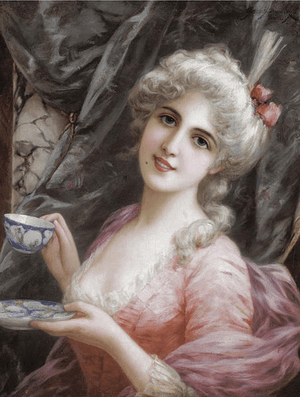The Importance of Lady Tea Time
"Kindly Peruse This Cordial Invitation" read the email’s subject line; the "Ladies of the Milk and Sugar Club" were inviting me to tea. On Wednesdays at 5:00pm we met in crowded dorm rooms, sipping chai and swapping stories. The invitation’s anachronistic language nodded to the oddity of holding Lady Tea Time in our liberal arts college setting—most of us had performed in The Vagina Monologues, after all—but each week our conversations were unironic, unarchaic. During Lady Tea Time, it was safe to voice my deepest, darkest gynecological fears. Finally, those fears could meet the raw laughter of recognition. Lady Tea Time helped me turn "Women’s History Month" into a weekly practice, rather than a yearly one.
Despite Women’s History Month’s yearly cameo, I wasn’t challenged to think critically about gender inequality until college. It was freeing to find language for experiences I didn’t have words for, and it was angering to see the havoc that internalized sexism had already wreaked. In a peer-led course called Female Sexuality, I was asked to describe the first time that I became aware of my gender identity. I remembered being pulled away from a group of friends after quoting Britney Spears’ "Oops I Did It Again" and being told, "That’s not how a lady speaks." I remember my brother knocking on my bedroom door, asking if he could play with me. "Boys aren’t allowed to play Barbies," I told him.
Both of those moments are crisp in my memory, maybe because of the shame that they induced. I felt shame for being singled out of a group, for having said the "wrong" thing, and shame that my brother wasn’t "acting" like a boy. The shame still lingers, but for different reasons. Now, I wish that someone could have helped me understand—and question—Britney’s lyrics. And I really wish that I had let my brother play Barbies with me. Growing up, would we have fought less if there weren’t any Barbies around to begin with? Would we all fight less if we didn’t learn such sexist (not to mention racist, classist, ableist, heteronormative) ways of playing and speaking so early on?
This Women’s History Month marks an important turn in my own feminist identity, as I’ve started working at Ma’yan, an organization that provides feminist, social justice, and leadership training to teen girls. Watching the digital video documentary that Ma’yan’s Research Training Interns (RTIs) created about sexism in entertainment media, "Pretty, Sexy, Sassy: How Girls and the Media Consume One Another," reminds me that the story I am working to change is already re-writing itself. The RTIs are a cohort of teen girls that meet weekly to discuss questions at the intersection of Judaism, feminism, and mass culture. Their film reminds me that images of what women are "supposed" to be are inescapable, no matter how fluently I can critique them.
We need every month to be Women’s History Month. And until then, we need to keep creating spaces that celebrate and hold all women’s histories every day of the week, week of the year.








Agreed. Having a dedicated Women's History Month can be useful, but we need to use it to reinvigorate our activism throughout the rest of the year.